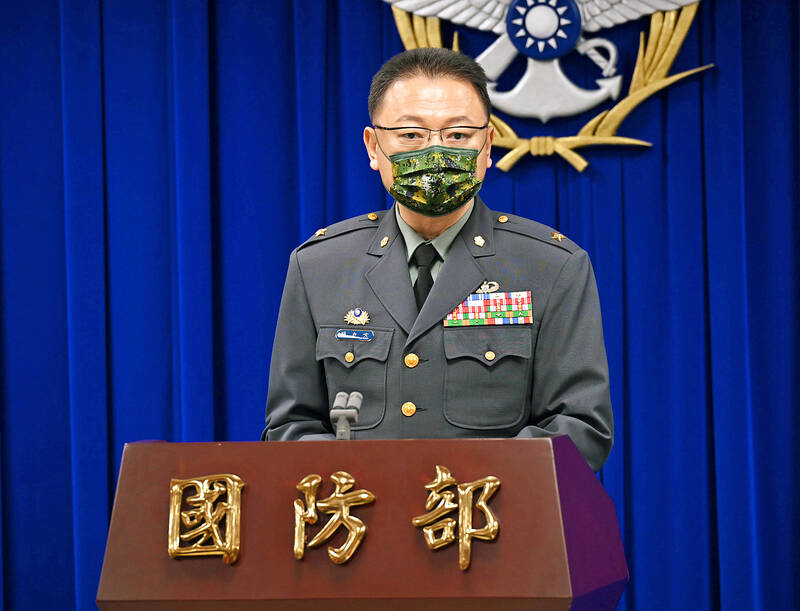Eight Chinese warplanes yesterday crossed the median line of the Taiwan Strait and flew close to waters under Taipei’s control, the Ministry of National Defense said.
The incursions occurred at about 8am and were part of what the Chinese People’s Liberation Army (PLA) calls “joint combat readiness patrols,” ministry spokesman Major General Sun Li-fang (孫立方) told a news conference in Taipei.
Nineteen Chinese warplanes were detected around Taiwan at the time, including an unspecified number of J-10 and J-16 fighter jets, Sun said, adding that eight of those breached the median line and approached the outer boundary of the contiguous zone, which is 24 nautical miles (44.4km) from Taiwan’s shore, Sun said.

Photo: Chang Chia-ming, Taipei Times
In addition to the aircraft, five PLA ships were detected in waters around Taiwan, Sun said.
The military used its joint intelligence, surveillance and reconnaissance system to closely monitor the PLA’s activities, and deployed aircraft, vessels and coastal defense missile systems in response, he said.
The Chinese Ministry of National Defense did not answer calls seeking comment.
The PLA’s Eastern Theater Command yesterday published pictures on WeChat of J-16 fighter jets taking off on a training mission “far out at sea,” saying it happened “recently.”
Without providing details, the command said the aircraft carried out “tactical long-range flight training” involving in-flight refueling that covered “thousands of kilometers.”
Minister of National Defense Chiu Kuo-cheng (邱國正) said during an interpellation session at the Legislative Yuan on March 6 that Taiwan’s armed forces would open fire on intruders if they entered Taiwan’s territorial waters or airspace.
PLA aircraft and ships entered the contiguous zone and approached Taiwan’s territorial waters and airspace during large-scale military exercises China conducted around Taiwan in August last year after then-US House of Representatives speaker Nancy Pelosi visited Taipei, Chiu said at the time.
If they had breached Taiwan’s territorial waters or airspace, the armed forces would have engaged, he said.
However, he said that to avoid giving the PLA reason to attack Taiwan, the military has always made a point of exercising self-restraint.
Additional reporting by AFP and Reuters

DAREDEVIL: Honnold said it had always been a dream of his to climb Taipei 101, while a Netflix producer said the skyscraper was ‘a real icon of this country’ US climber Alex Honnold yesterday took on Taiwan’s tallest building, becoming the first person to scale Taipei 101 without a rope, harness or safety net. Hundreds of spectators gathered at the base of the 101-story skyscraper to watch Honnold, 40, embark on his daredevil feat, which was also broadcast live on Netflix. Dressed in a red T-shirt and yellow custom-made climbing shoes, Honnold swiftly moved up the southeast face of the glass and steel building. At one point, he stepped onto a platform midway up to wave down at fans and onlookers who were taking photos. People watching from inside

A Vietnamese migrant worker yesterday won NT$12 million (US$379,627) on a Lunar New Year scratch card in Kaohsiung as part of Taiwan Lottery Co’s (台灣彩券) “NT$12 Million Grand Fortune” (1200萬大吉利) game. The man was the first top-prize winner of the new game launched on Jan. 6 to mark the Lunar New Year. Three Vietnamese migrant workers visited a Taiwan Lottery shop on Xinyue Street in Kaohsiung’s Gangshan District (崗山), a store representative said. The player bought multiple tickets and, after winning nothing, held the final lottery ticket in one hand and rubbed the store’s statue of the Maitreya Buddha’s belly with the other,

‘NATO-PLUS’: ‘Our strategic partners in the Indo-Pacific are facing increasing aggression by the Chinese Communist Party,’ US Representative Rob Wittman said The US House of Representatives on Monday released its version of the Consolidated Appropriations Act, which includes US$1.15 billion to support security cooperation with Taiwan. The omnibus act, covering US$1.2 trillion of spending, allocates US$1 billion for the Taiwan Security Cooperation Initiative, as well as US$150 million for the replacement of defense articles and reimbursement of defense services provided to Taiwan. The fund allocations were based on the US National Defense Authorization Act for fiscal 2026 that was passed by the US Congress last month and authorized up to US$1 billion to the US Defense Security Cooperation Agency in support of the

HIGH-TECH DEAL: Chipmakers that expand in the US would be able to import up to 2.5 times their new capacity with no extra tariffs during an approved construction period Taiwan aims to build a “democratic” high-tech supply chain with the US and form a strategic artificial intelligence (AI) partnership under the new tariffs deal it sealed with Washington last week, Taipei’s top negotiator in the talks said yesterday. US President Donald Trump has pushed Taiwan, a major producer of semiconductors which runs a large trade surplus with the US, to invest more in the US, specifically in chips that power AI. Under the terms of the long-negotiated deal, chipmakers such as Taiwan Semiconductor Manufacturing Co (TSMC, 台積電) that expand US production would incur a lower tariff on semiconductors or related manufacturing